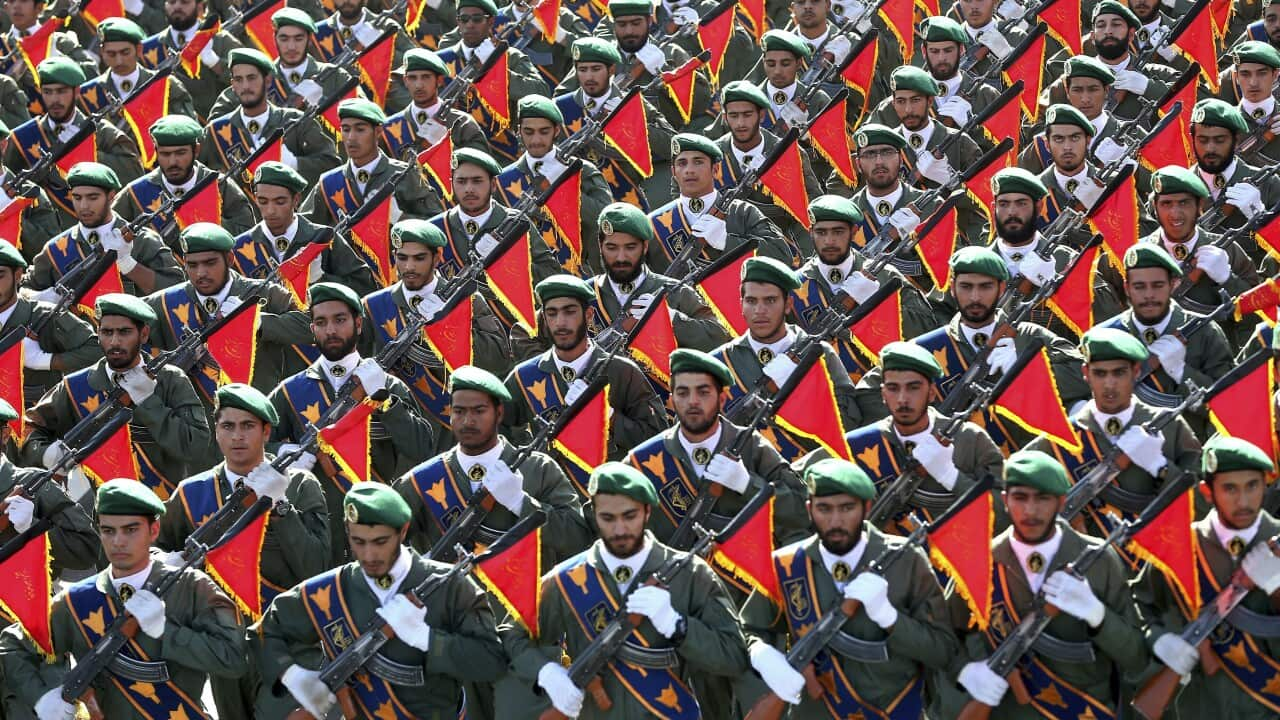Australia is facing pressure to take a stronger stance against Iran and list the Islamic Revolutionary Guard Corps (IRGC) as a terrorist organisation, following its attack on Israel.
In an unprecedented move, Iran fired over 300 missiles and drones into Israeli territory on Saturday.
It claims the attack was in response to a deadly strike on its consulate in Syria two weeks earlier.
Israel’s deputy ambassador to Australia, Chris Cantor, said the strike justifies tougher sanctions on Iran, urging the federal government to swiftly change the IRGC listing.
“The aim here is to minimise the Iranian threat, the Iranian capability,” Cantor said in Canberra on Monday.
The federal Opposition has joined calls for Australia to reflect a similar position to ally United States, which declared the IRGC a terrorist group in 2019.
Opposition foreign affairs spokesperson Simon Birmingham said it was “beyond time”, given the group’s actions.
“The IRGC speak like terrorists, collaborate with terrorists and act like terrorists. If our laws need changing to undertake such listing, then they should be changed ASAP,” he said.
However, experts warn against Australia changing its position.
What is the Islamic Revolutionary Guard Corps?
The IRGC was set up shortly after the 1979 Islamic Revolution to protect the newly established Shi’ite Muslim clerical ruling system and protect the country from internal and external threats.
It’s separate from Iran’s regular armed forces.
It answers to Supreme Leader Ayatollah Ali Khamenei and has an estimated 125,000 to 135,000 strong military, including army, navy and air units.
It also commands the Basij religious militia, a volunteer paramilitary force used to crack down on anti-government protests, and has an overseas arm called the Quds Force.
Miriam Farida, lecturer in terrorism and counter-terrorism studies at Macquarie University, said the Quds Force “coordinates overseas actors and proxies that answer to Iran”.
It provides training and arms to groups including Hamas in Palestine, Hezbollah in Lebanon, the Houthis in Yemen and Shia militias in Iraq and Syria.
The Quds Force’s top commander, Major-General Qassem Soleimani, was killed by the US in a drone attack in Iraq in 2020, sparking concerns over a major conflict at the time.
Farida said it’s important to note that the group is not separate from the government but is “embedded within the fabric” of the Iranian government.
How much power does the IRGC hold in Iran?
Greg Barton, professor of Global Islamic Politics at Deakin University said it now dominates “every tier of leadership in Iran”.
“On the face of it, it presents itself as being sort of guardians of religious purity, but actually their main focus is on safeguarding their business interests and their control of the Iranian state and economy,” he told SBS News.
“They really control the state. So there are still separate sections of the military, but everything else in Iran is subservient to them.”
People gather in the Iranian capital Tehran on Sunday in support of the Islamic Revolutionary Guard Corps’ attack on Israel. Source: Getty / Majid Saeedi
Why isn’t it listed as a terrorist organisation?
The US, Sweden, Bahrain and Saudi Arabia have designated the IRGC as a terrorist organisation.
But Farida said it is problematic to classify the IRGC as a terrorist group as “it is embedded within the government and functioning under a political umbrella”.
She likened the dynamic to Hezbollah, which also has both political and armed wings. The Australian government only recognises the military wing of Hezballah as a terrorist organisation.
Barton explains that labelling the entirety of the IRGC as a terrorist organisation would have implications on the government’s ability to deal with that group.
“Once we list a group as a terrorist organisation, we can’t be having any dealings with it. It’s a binary position,” he said.
“So often that leads to pressure to list one element of a group, a militant wing as a terrorist group, but not necessarily the entire group.”
While Australia doesn’t engage in regular diplomatic relations with Iran, he said it would create a hostile and difficult environment where you can’t negotiate anything.
The federal government would also be forced to pull back and close the embassy as it “can’t deal with the group that runs the state”.
A member of the Iranian diaspora protests in front of the Iranian Embassy in London on Sunday. Source: Getty / Peter Nicholls
Will Australia change its stance?
Both experts concluded that Australia won’t change its IRGC listing in the immediate future.
“The government stands to lose more by listing them than we stand to gain … and is likely to make the current problems worse rather than better,” Barton said.
He adds that Iran’s attack on Israel was a calculated strike intended to damage “but not intended to do enough damage to start an all-out confrontation with Israel”.
Barton said this shows that even the IRGC understands that a full-scale war in the region comes with an “enormous cost”.
The Minister of Home Affairs has been contacted for comment.


